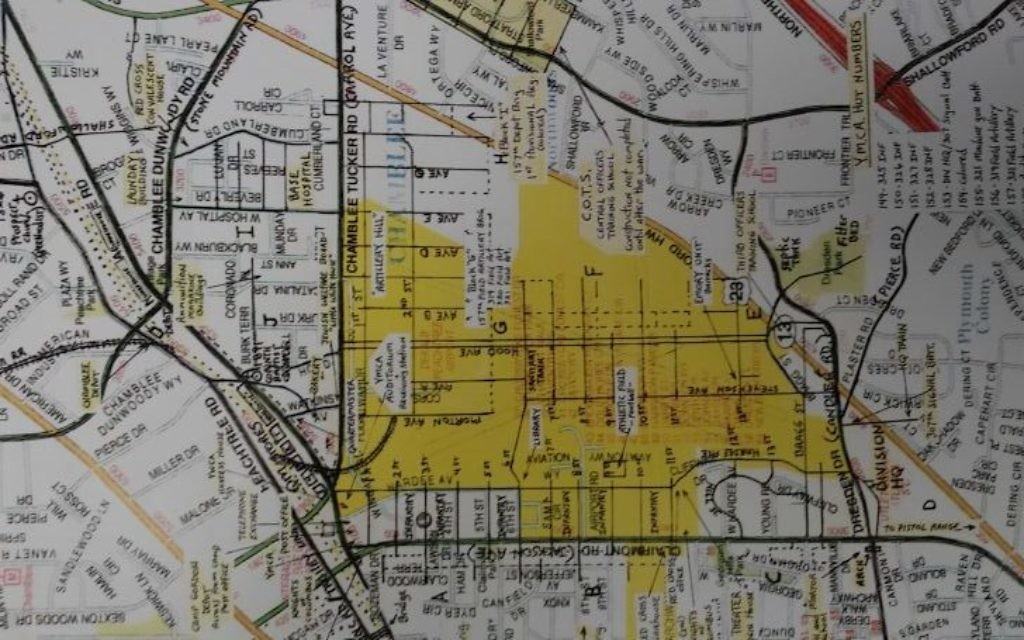Memorial to Honor WWI Soldiers Slain in Canton
Two of the three men from Camp Gordon were Jewish, historian Michael Hitt has found.

A memorial service marking the 100th anniversary of the deaths of three American soldiers killed during World War I will be held Saturday, June 16, in Cherokee County.
But the soldiers, at least two of whom were Jewish, were not killed in distant Flanders Fields by the Germans. Instead, they were victims of sabotage, plunging to their deaths in the Etowah River on a secret mission to round up draft dodgers and deserters.
Those men avoiding the war in Europe were responding to the incitement of Tom Watson and his Jeffersonian newspaper, said retired Roswell police officer Michael Hitt, the amateur historian who has meticulously pieced together the story of what happened that morning at Steele’s Bridge.
Get The AJT Newsletter by email and never miss our top stories Free Sign Up
Watson, whose statue stood outside the state Capitol for decades, is the same newspaper publisher who stirred up the anti-Semitic furor that led to Leo Frank’s lynching less than two years before the United States entered the war.
Watson argued that the military draft was unconstitutional and urged men not to report for service. Hitt said anti-war meetings fired up military-age farmers and their families and collected money to help them hide.
One hideout was in the wilds of Cherokee County. A deputy marshal in Canton worked with federal revenue agents and the Army to organize a raid that would catch as many of the “slackers” as possible and, more important, look for documents that would tie their activities to Watson, the ultimate target.
The men dodging the military were armed and dangerous. Efforts to catch individual deserters led to shootouts that killed law officers, Hitt said, and the men had the backing of families whose names are on maps around Cobb, Cherokee and northern Fulton counties today, such as Howell, Wesley and Mabry.
About 65 men were part of the raid, which included three 2-ton Velie trucks and four cars. They left Camp Gordon on June 15, 1918, and made for an artillery range in Marietta, then left that staging area early June 16.
But the convoy took too long reaching Canton, in part because it stopped along the way to search for evidence that would incriminate Watson.
One man got lost in the woods during such a search, Hitt said, so 10 men and one of the Velie trucks stayed behind to find him.
By that time, it was midmorning, and the secret of the raid was blown. People along the way may have spread the word. A mysterious man on horseback seen when the convoy set out from Marietta may have been to blame. Hitt suspects an informer at Camp Gordon — a soldier who later deserted — sent out a warning as soon as the raiding force left.
Regardless, the convoy headed up Bells Ferry Road to Steele’s Bridge Road to cross the Etowah. Three cars went across with no problem, but the first Velie truck on the bridge dropped through wood that had been sabotaged so it couldn’t handle the weight. The truck fell 40 feet and flipped over, trapping about 30 soldiers inside.
Remarkably, only three died, and 13 others were hurt badly enough to require hospital care.
The Jewish soldiers who died were Sgt. Abe Marguesee, a medic whose death was reported the next day in his hometown newspaper in Syracuse, N.Y., and Cpl. Sam Smith, who had turned down leave to visit his family in Massachusetts so he could participate in the raid.
The third victim, whose religion Hitt has not been able to confirm, was Pvt. Ernest Rhinesmith. All had been part of the Army’s 82nd Division but stayed behind when the division went over there to Europe.
The disaster was front-page news but was reported as an accident by Atlanta newspapers under military censorship, Hitt said. The Augusta newspaper, by contrast, quickly pointed to sabotage.
No one was ever arrested for the crime, and Georgia deserters benefited from an amnesty freeing farmers to work their fields. Watson won election to the U.S. Senate in 1920 but died in 1922. The Steele’s Bridge area was lost to the lake; the Bridge Mill subdivision rose nearby.
The deaths of the three soldiers were forgotten until Hitt stumbled upon the case while doing research about Camp Gordon as part of a Chamblee project.
His discovery came in time to organize the centennial memorial, which will include Hitt’s recounting of the story and a memorial prayer led by Rabbi Barry Coffsky.
What: Memorial for slain soldiers
Where: 810 Bridge Mill Ave., Canton
When: 3 p.m. Saturday, June 16
Admission: Free; mdhitt2000@yahoo.com for details




comments